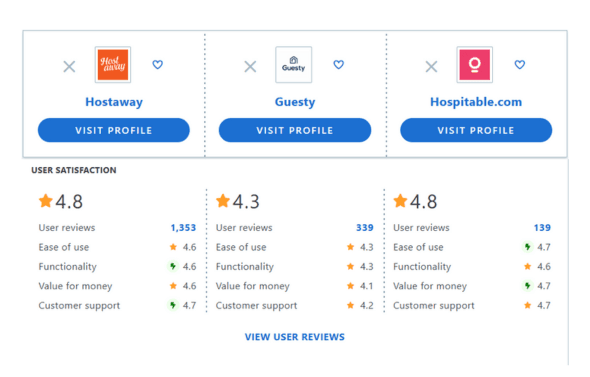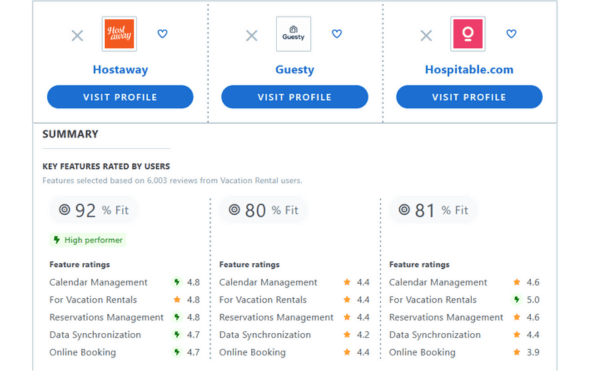Guesty vs Hospitable vs Hostaway: Complete Property Management Software Comparison for 2025

Key Takeaways
Guesty, Hospitable and Hostaway each solve similar problems for vacation rental operators, but they’re built for very different types of businesses, from solo hosts to enterprise-level managers.
Guesty leans enterprise with deep features but higher costs, Hospitable focuses on simple automation for smaller portfolios and Hostaway offers scalable tools, 300+ integrations and strong API connections that work for any stage of growth.
The biggest practical differences show up in pricing models, channel manager reliability, depth of integrations, support quality and how each platform handles direct bookings, automation and operations.
Hostaway stands out for its scalability, industry-leading marketplace, direct booking tools and 24/7 global support, making it a strong long-term choice for managers who plan to grow.
Choosing the right PMS comes down to matching your portfolio size, growth plans and tech needs to the strengths of each platform, not just comparing features on paper.
Here’s the thing, vacation rental software isn’t just another tool. For Airbnb hosts and property managers, it’s the backbone of the business. The right property management software can mean the difference between smooth growth with fewer headaches or juggling spreadsheets, double bookings and frustrated guests.
That’s why comparisons like Guesty vs Hospitable vs Hostaway are more than just academic. Each of these platforms solves the same problem, helping you manage bookings, automate tasks and grow revenue, but in very different ways. Guesty leans enterprise, with complex systems designed for larger property management companies. Hospitable stays lightweight, focusing on guest communication and basic automation for smaller operators. Hostaway takes the middle ground (and then some), offering scalability, integrations and direct booking capabilities that work for both individual hosts and larger teams.
In this 2025 breakdown, we’ll compare their pricing models, channel manager capabilities, integrations and support to uncover which platform is the best fit for your short-term rental strategy.
What Property Management Software Does (and Why It Matters)
Running a short-term rental looks simple from the outside, list a property, welcome guests, collect revenue. In reality, every booking involves dozens of moving parts: pricing updates, guest messages, calendar syncing, payments processing, cleaning schedules and reviews. That’s where property management software (PMS) comes in.
At its core, vacation rental software is designed to help property managers and hosts streamline operations. Instead of juggling spreadsheets or logging into multiple platforms, a PMS brings everything into one dashboard. Here are some of the most important things it can do:
Channel management – Sync calendars and rates across Airbnb, Vrbo, Booking.com and more, avoiding double bookings.
Guest management – Centralize all guest communication, automate check-in instructions and send review requests.
Dynamic pricing – Adjust nightly rates based on demand, seasonality or local events to maximize revenue.
Direct bookings – Build your own branded website with a booking engine, so you’re not relying only on OTAs.
Automation tools – From scheduling cleanings to sending invoices, PMS platforms take repetitive work off your plate.
Analytics & reporting – Track performance, owner statements and revenue to make smarter business decisions.
For property management companies or even individual hosts scaling from a handful of listings, these tools aren’t just nice-to-haves, they’re the foundation of running a professional STR business. Choosing between Guesty, Hospitable and Hostaway comes down to which combination of features, integrations and pricing models best fits your stage of growth.

Guesty vs Hospitable vs Hostaway: High-Level Comparison
When comparing property management software platforms, it helps to zoom out before digging into the details. Each system, Guesty, Hospitable and Hostaway, was built with a different type of customer in mind. Some focus on large property management companies, others on individual hosts and a few (like Hostaway) are designed to scale with you as your vacation rental business grows.
Here’s a quick look at how they stack up on key aspects like pricing models, integrations, channel manager coverage and customer support.
Feature / aspect | Guesty | Hospitable | Hostaway |
Primary target | Large-scale property managers (50+ properties) | Small to mid-size hosts (1–20 properties) | All sizes, from 2 to 10,000+ properties (especially strong in the 5–100 range) |
Pricing model | Percentage of booking revenue (2–5%) + Onboarding Fee | Flat fee per property (tiered system) | Custom quote based on portfolio size and needs (often a flat fee) |
Direct channel API | Airbnb, Vrbo, Booking.com, Expedia, TripAdvisor | Airbnb, Vrbo, Booking.com | Airbnb, Vrbo, Booking.com, Expedia, Marriott Homes & Villas, Google Travel, TripAdvisor and more |
Marketplace size | 200+ integrations | ~30 integrations | 300+ integrations (largest in industry) |
Owner portal | Yes (Advanced) | No | Yes (Advanced, with statements & analytics) |
Open API | Yes | Yes | Yes (highly flexible and robust) |
Customer support | Dedicated account manager (higher tiers) | Email/Chat only | 24/7 Global Support via chat, email and phone |
Mobile app | Yes (for managers and staff) | Yes (focused on messaging) | Yes (comprehensive for managers, staff and owners) |
At a glance:
Guesty positions itself as an enterprise-heavy platform with advanced functionality, but its pricing model (percentage of revenue + fees) makes it best suited for large operators.
Hospitable offers simplicity and affordability with its flat-fee pricing, but its limited functionality and smaller marketplace of integrations mean it’s best for solo hosts or small teams.
Hostaway blends enterprise-grade tools with flexibility, offering the largest marketplace in the industry, transparent pricing tailored to your portfolio and 24/7 support that appeals to both individual hosts and scaling managers.

Guesty vs Hospitable vs Hostaway Compared
Guesty
Guesty is often described as the “enterprise” option in the vacation rental software market. It comes with a broad range of features, multi-calendar management, payment processing, guest communication services, dynamic pricing (via Guesty PriceOptimizer), task management and accounting tools. For property management companies running 50+ listings, this depth can be valuable.
But there’s a trade-off. Guesty’s pricing model is a percentage of booking revenue (typically 2–5%), plus onboarding fees. That structure can quickly eat into profits, especially for growing managers. Some users also mention hidden fees for add-ons like advanced analytics, insurance or expanded support. Reviews often point out a learning curve, with the Guesty platform feeling fragmented since many features come from acquisitions or third-party tools.
Best fit: Established property managers with large portfolios who want robust features and don’t mind higher costs.
Hospitable
Hospitable takes the opposite approach. Instead of enterprise-level complexity, it focuses on simplicity and basic automation. The platform is best known for its automated guest messaging, review management and calendar syncing across Airbnb, Vrbo and Booking.com. It also integrates with third-party dynamic pricing tools like Beyond, PriceLabs and Wheelhouse.
Where Hospitable shines is affordability. Its flat-fee pricing is clear and predictable, making it attractive to individual hosts or managers with fewer than 20 listings. But this comes with limited functionality. There’s no owner portal, fewer integrations (~30 compared to 200+ or 300+ on competitors) and its channel manager doesn’t support the same depth of direct API connections.
Best fit: Smaller STR businesses or new hosts who want a user-friendly system that covers guest management and messaging without overwhelming them.
Hostaway
Hostaway is built to scale. Whether you’re managing 5 listings or 500, the platform offers enterprise grade tools without locking out individual hosts. Its standout strength is connectivity: with 300+ integrations, Hostaway has the largest marketplace in the industry, including exclusives like Google Vacation Rentals and Marriott Homes & Villas. Add to that its Premier Partner and Elite Partner status with Airbnb and Vrbo and you get one of the most reliable channel manager systems available.
Beyond integrations, Hostaway offers a comprehensive owner portal, a unified mobile app for managers, staff and owners, and flexible automation tools that cover everything from guest communication to task scheduling. Its transparent pricing is custom to each portfolio but designed to avoid nickel-and-diming with surprise add-ons. Support is another differentiator, unlike its competitors, Hostaway provides 24/7 global assistance via phone, chat and email.
Best fit: Professional property managers and ambitious hosts looking for a long-term partner that grows with their portfolio. If your goal is to build a scalable vacation rental business with direct bookings, advanced reporting and integrations that unlock new revenue streams, Hostaway stands out.
Key Areas of Comparison
Choosing between Guesty, Hospitable and Hostaway isn’t just about checking off features, it’s about how well each platform aligns with your goals as a host or property manager. Let’s break down the most important factors.
1. Pricing models and costs
Guesty uses a revenue-share approach, charging 2–5% of every booking plus onboarding fees. While this can work for large property management companies, many operators find the ongoing cut and add-ons expensive over time. Hospitable is more predictable, with a flat-fee pricing model that scales per property.
Hostaway takes a custom-quote approach. Though you need to contact their team for a demo and pricing, the structure is built to be more flexible and avoids surprise hidden fees. Importantly, Hostaway doesn’t penalize property managers for growth. Instead, as you move into higher tiers, the per-property price decreases, rewarding scale rather than making it more costly.
2. Integrations and marketplace
Here the differences are stark. Hospitable supports around 30 integrations, enough for basic automation but limited for growth. Guesty connects to about 200 tools, while Hostaway leads the industry with over 300 integrations. This includes premium connections like Google Vacation Rentals, Marriott Homes & Villas and smart home tech like smart locks. For managers who want to build a sophisticated tech stack with predictive analytics, revenue tools and owner reporting, Hostaway offers unmatched capabilities.
3. Direct bookings and website builder
Hospitable provides a direct booking option with a simple website builder, but it’s not designed for advanced customization. Guesty offers websites too, but often as add ons. Hostaway, by contrast, has a built-in booking engine and website builder that can be customized to fit your brand. For property managers aiming to reduce reliance on OTAs, this makes a big difference.
4. Automation, guest management and communication
Hospitable’s strength is guest communication. Its automated messages and review tools make it a favorite among small hosts who want peace of mind. Guesty also supports automation, but users sometimes complain about complexity and even bad reviews around onboarding. Hostaway combines guest management with task automation, cross-listings and even contract signatures, allowing teams to manage bookings and operations smoothly at scale.
5. Support and knowledge base
Support can make or break your experience. Guesty provides tiered support, with dedicated account managers only available at higher plans. Hospitable relies on email and chat, which works for smaller hosts but not for urgent issues. Hostaway sets itself apart with 24/7 global support by phone, chat and email, plus a detailed knowledge base and onboarding team that helps both new individual hosts and experienced managers.

Which Software is Right for You?
So after looking at Guesty, Hospitable and Hostaway, how do you decide which vacation rental software fits your business? The answer depends on your portfolio size, budget and long-term goals.
Hospitable is the best match for smaller operators or individual hosts running a handful of listings. Its strength lies in guest communication and basic automation, making it easy to keep calendars aligned and respond to guests without spending hours each day on manual work. But its limited functionality means you’ll likely outgrow it once you expand.
Guesty is designed for larger property management companies with complex operations. It offers a broad range of tools, from accounting to advanced reporting, but the trade-off is a steeper learning curve and a pricing model that can cut into profits with hidden fees and costly add ons.
Hostaway is the best of both and often the growth path. It’s flexible enough for individual hosts but powerful enough for professional property managers with hundreds of listings. Between its 300+ integrations, direct bookings tools and advanced channel manager, it’s built to help you streamline operations and scale without switching systems later.
All in all,
Go with Hospitable if you want simple software to automate messages and calendars.
Choose Guesty if you’re an established enterprise that values robust features over simplicity.
Pick Hostaway if you want a scalable, all-in-one platform that adapts as your STR business grows.
Making the Right PMS Choice for Your Rental Business
The decision between Guesty, Hospitable and Hostaway comes down to more than just a list of features. It’s about matching the right vacation rental management software to your stage of growth, your portfolio size and how you want to streamline operations.
If you’re a solo host or running just a few vacation rentals, Hospitable is a cost-effective, user-friendly way to handle guest communication and basic automation.
If you’re running a large-scale operation and don’t mind a higher pricing model with potential add ons, Guesty delivers enterprise-level depth, though at a premium.
If your goal is to scale without switching systems, Hostaway offers the integrations, scalability and support to help both individual hosts and professional property managers manage their business today and expand tomorrow.
In short, all three platforms can help you run a smoother vacation rental business, but only Hostaway combines flexibility, depth and long-term scalability in a way that grows with you.
FAQs: Guesty vs Hospitable vs Hostaway
1. Which PMS has the fastest onboarding process?
Hospitable typically has the quickest setup since it focuses on lightweight tools and user friendly interfaces. Guesty and Hostaway require more onboarding time, but that’s because they come with a wider set of capabilities and integrations.
2. Do these platforms support predictive analytics?
Guesty and Hostaway both offer access to third-party tools for predictive analytics on revenue and demand forecasting. Hospitable doesn’t provide this natively, it leans on external pricing engines instead.
3. How do Guesty Lite and Hospitable compare for individual hosts?
Guesty Lite is built for hosts with just a few listings, but it still comes with a pricing model tied to booking volume. Hospitable’s flat-fee approach is often cheaper and simpler for individual hosts managing fewer than 20 properties.
4. Can these platforms integrate with smart locks?
Yes. Guesty and Hostaway both have direct integrations with major smart locks providers, which means you can automate check-ins and check-outs. Hospitable doesn’t offer this natively but works through third-party integrations.
5. Which PMS offers the best long-term value for property managers?
If you only plan to manage a handful of vacation rentals, Hospitable is a safe bet. But for property managers aiming to scale portfolios or attract owners, Hostaway tends to offer the best balance of tools, support and transparent pricing over time.
Ready to find out how Hostaway can transform your business?
